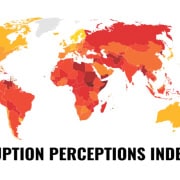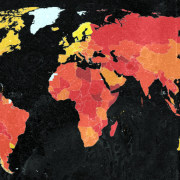|
Getting your Trinity Audio player ready...
|
The 2019 Corruption Perceptions Index (CPI), released today by Transparency International (TI), the global coalition against corruption, reveals that more than two-thirds of the 180 countries on the index score below 50, with an average score of just 43. South Africa has improved marginally from a score of 43 in 2018 to 44, which still places it squarely amongst countries deemed to have a serious corruption problem, and to not be doing enough in their anti-corruption efforts.
The index, considered to be the leading global indicator of public sector corruption, ranks 180 countries and territories by their perceived levels of corruption in the public sector according to experts and business people. It uses a scale of zero to 100, where zero is highly corrupt and 100 is very clean.
This year’s report highlights the importance of the relationship between money, political power and corruption. Further analysis shows how corruption is more pervasive in countries where big money can flow freely into electoral campaigns. Those better performing countries on the CPI tend to have stronger enforcement of campaign finance regulations, while conversely those countries with lower scores either lack such regulating mechanisms, or, where they do exist are not sufficiently enforced. Parliament passed South Africa’s Political Party Funding Act in January 2019, but the president has yet to bring the Act into operation. Unless there is a clear demonstrated political will to enforce key measures and legislation regulating political party funding, as well as to hold internal party members accountable, the perception remains that the country is not doing enough.
David Lewis, executive director of Corruption Watch, commented: “The failure, after a year, to bring the Political Party Funding Act into operation does little to inspire confidence in the strength of government’s will to tackle corruption. In addition, the South African public has made it clear that until there is visible progress in prosecuting those responsible for corruption and until there is visible improvement in the ability of state-owned-enterprises to deliver their vital services, government’s promises to combat corruption will not be trusted.”
As in previous years, sub-Saharan Africa is the lowest-scoring region on the CPI, with an average of 32, indicating concerning levels of corruption and inaction in tackling it. In sub-Saharan Africa as a whole, perceptions indicate that money is frequently used to win elections, buy influence, consolidate power and further personal interests. The African Union Convention on Preventing and Combating Corruption has provisions to prevent corruption and encourage transparency, but clearly, in many countries, these are not sufficiently implemented, if at all.
South Africa ranks 70 out of the 180 countries measured, and is surpassed by eight other sub-Saharan African countries.
| COUNTRY | SCORE | RANK |
| Seychelles | 66 | 27 |
| Botswana | 61 | 34 |
| Cabo Verde | 58 | 41 |
| Rwanda | 53 | 51 |
| Mauritius | 52 | 56 |
| Namibia | 52 | 56 |
| Sao Tome and Principe | 46 | 64 |
| Senegal | 45 | 66 |
| South Africa | 44 | 70 |
| Benin | 41 | 80 |
The report has some useful
recommendations for countries needing to reduce corruption and restore trust in
political leaders and those in public office. In addition to closer regulation
of political party funding, the report recommends measures to reduce
possibilities for special interest involvement in disbursement of budgets and
public services; to eliminate conflicts of interest; to regulate political
lobbying and sanction misinformation campaigns; and to strengthen protection of
whistleblowers, journalists and activists.
Lewis added: “The toxic influence of money in politics would also be exposed and constrained were we to commence with promised lifestyle audits of politicians and public officials, to introduce more stringent application of regulations governing asset and income declarations and to require companies to identify their beneficial owners.”
To access the 2019 CPI report and/or executive summary, click here.
For more information:
Phemelo Khaas 083 763 3472 phemelok@corruptionwatch.org.za








